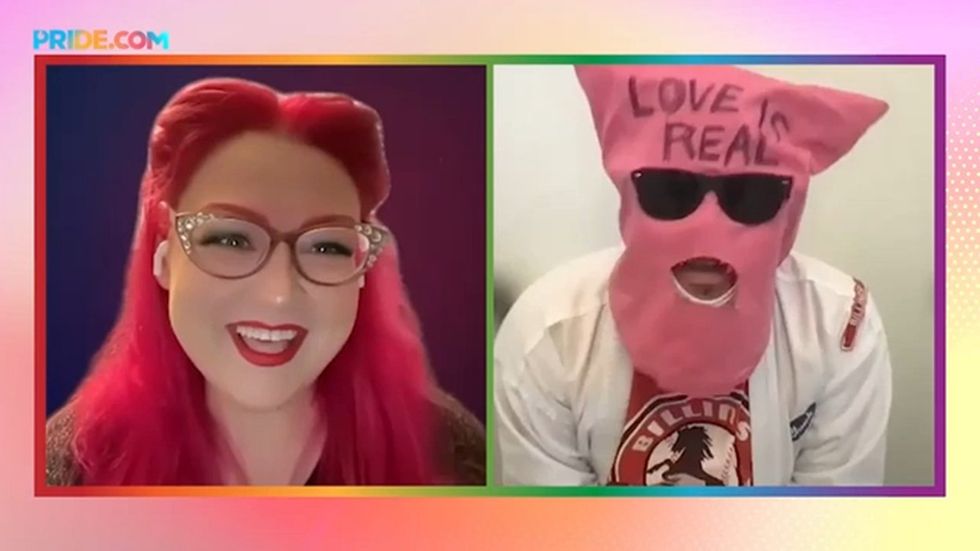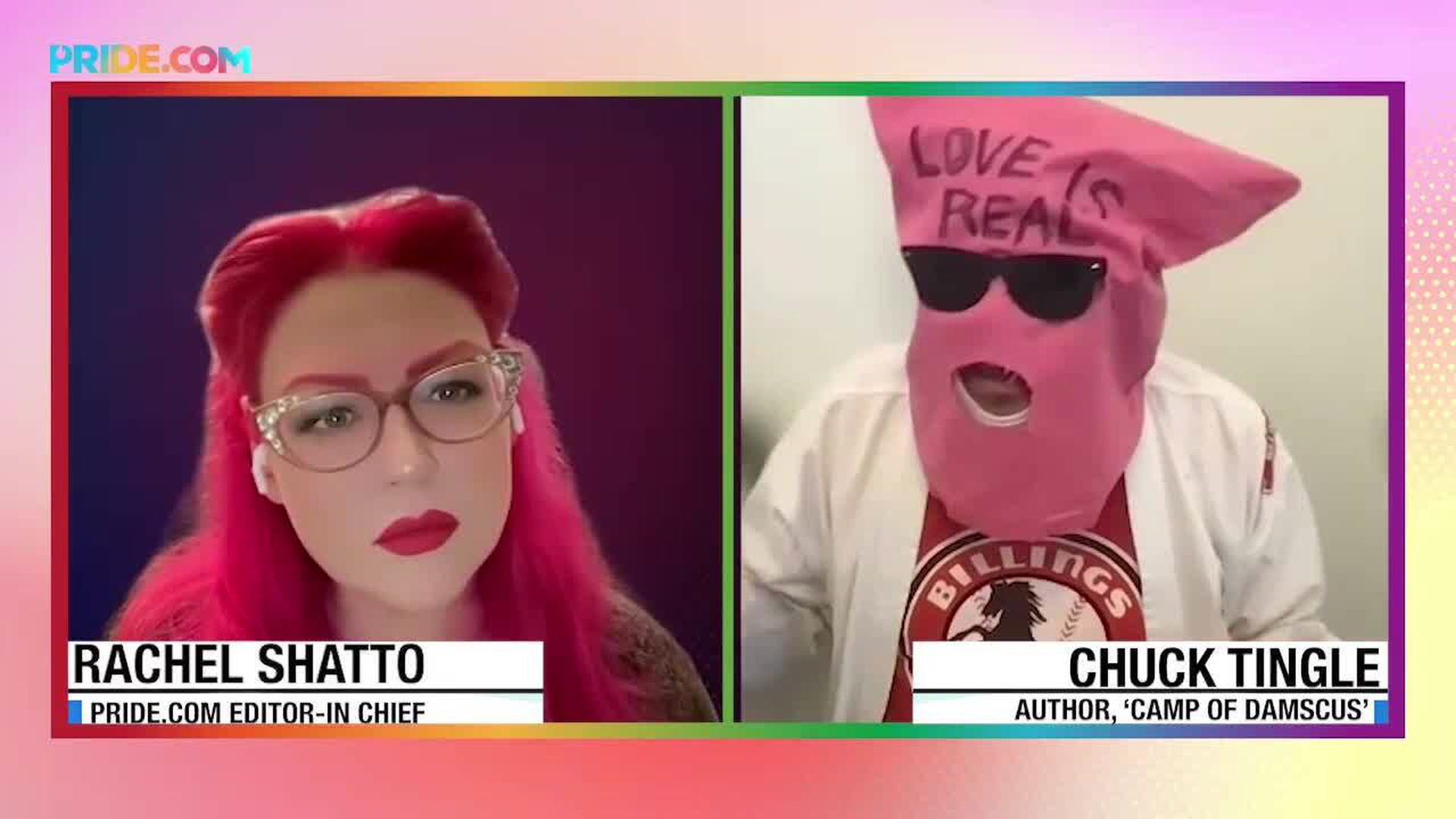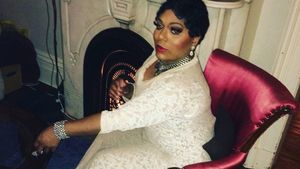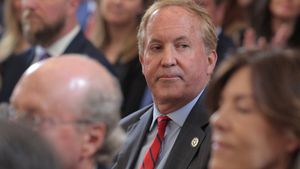Rarely have I been filled with more anticipation than when I waited for author Chuck Tingle to hop on the Zoom call. For years I have appreciated his work as an author of witty self-published erotica (Tinglers) with names, premises, and covers created to be memed. I’ve also appreciated his clever, gentle, and incisive trolling against unkindness and bigotry. And of course, I’ve wondered about his persona and presentation. He is never seen without his pink “love is real” mask, so when he finally joined the call I was delighted (and perhaps a little disappointed) that he indeed arrived donning his full accouterment. But all of that fell away as soon as we started talking about his stellar new horror novel Camp Damascus.
The book follows a young woman named Rose who has grown up in a remote town ruled over by the local evangelical church. The organization is known for running the “most effective” gay conversion camp in the country. It boasts a 100 percent success rate, but very few locals know the hellish ends the church goes to in the name of scaring their campers straight.
The book marks the first time the Hugo Award-nominated author has seen his work published traditionally — in this case by Tor — and is being hailed as his conversion camp horror novel. While that’s technically true, it’s a different take than any other story that has attempted to cover that fertile ground for horror. It’s gentle, kind, and cathartic, while also managing to be terrifying. Both supernatural and mundane terrors are mined in its pages, but his ultimate message is loud and clear by the time the final one is turned: Love is real.
Over the course of nearly an hour, I spoke with Tingle about his writing process, his hopes for how the audience receives the novel, how personal the story became, why gentleness is such a trademark of his writing — and so much more.
Watch PRIDE's full interview with Chuck Tingle below.
PRIDE: What inspired this book for you? What was the kernel of the idea that kicked off Camp Damascus for you?
CHUCK TINGLE: The way that I write, I think, is maybe kind of unique in that I have ideas constantly spinning around in my mind. And I have themes. There’s this kind of phrase of you let your characters lead, that’s kind of the modern advice. Previously, I think they said to let the beats of the story lead. Actually, in a kind of a controversial way, my leader is always meaning or message. Character and beats are very important and that works very well, but my preference is to think ‘what am I trying to say. What am I trying to give to the audience, out of respect for their time?’ And just because that’s what I like, an arc. The only time that I find myself ever disappointed with a movie, or a book, or anything like that, is if I come away and think, ‘Wow, I didn’t receive anything from that.’
Every morning, I go for a long walk up the dang hill, and I trot up the hill, and then I trot back down. And that’s where I do most of my thinking. These ideas and these messages swirl together, and then sometimes they’ll kind of collide into each other. And I think ‘Oh that’s what that meant the whole time.’ So I will say, I’ll try to avoid Camp Damascus spoilers, but the ending scene of the book was the first thing that I thought of, and it really matched with a message that I wanted to deliver about kind of the reality of what love is, and the way that I think some groups twist that around and interpret it in their own way.
I love the horror genre. And I think it’s for the same reason that you’re talking about. I feel like the power of horror is that it allows you to dig into social issues or messages in a way that sneaks under people’s automatic defenses. Was there a part of you that was thinking horror was the best medium for delivering your message?
I love horror. I call it the maligned trinity of genres, which is horror, comedy, and romance/erotica, and I think they’re maligned because they create reactions of the body. Horror creates fear or a scream, erotica and romance creates arousal, and comedy creates laughter; these are instinctive reactions. So I find the snooty intelligentsia will say, ‘Oh, no, those aren’t worthy of awards or real criticism. They’re not literary in any way.’ I could have always disagreed with that. I find those genres the most exciting because there is a raw honesty and truth in them. So because of that, going from erotica — Tinglers — to writing horror novels was a pretty easy move, because that’s kind of where I like to dabble in the honesty of these sorts of bodily genres. You take these honest reactions to these instinctual kinds of primal things and then you combine that with a thoughtful message or some sort of criticism. I think that’s just so powerful. So that’s always where I like to play.
One of the hallmarks of your writing is that there’s a gentleness to it, even when it’s terrifying. I feel like you’re taking great care of your reader and want to entertain but also avoid traumatizing or retraumatizing them. Is that intentional on your part?
I think that writing for any kind of marginalized community — of which I am a part, the queer community [and] the neurodivergent community — these stories are so important. And I think there’s an important version of this that’s traumatizing because these are reflections of a traumatic experience in a lot of ways. But I think that there’s already a lot of them. And so I don’t disparage that at all, I think there’s definitely a place for it. But for me, what I want to contribute and I think what is fulfilling for me, is creating a space of catharsis and creating a space of empathy, maybe for someone outside of this community to both understand the trauma without reexperiencing it to the fullest, because we deal with that every day. The queer community, we already know the traumas of this. So let’s explore a little bit of the queer joy and catharsis.
Speaking of the empathy-building aspect. Rose Darling, your lead character, is neurodivergent. What do you hope readers will take away from seeing the world through Rose’s eyes and experiencing the story through her perspective?
I think a lot of buckaroos, because I have a pretty unique way of presenting myself, I wonder how my autism manifests. What parts of all of this are kind of a way of protecting my privacy? Which parts of it are just part of my way on the spectrum? And so I kind of wrote Rose in a way of, if you want to know exactly what I’m like without hiding my identity or all of these different things. Rose’s autism is mine. It is 100% modeled after my way of navigating. All the things that she does, from writing note cards before social events to kind of have a logical track of things, seeing everything in a very curious but also logical [way], following these steps kind of way. Everything is small little facts, kind of jumbled up that can be overwhelming, but also helpful sometimes.
I wanted to write Rose to also be just a quick answer, because everyone sometimes asks, ‘Well, Chuck, how do you express your way on the autism spectrum?’ And so I thought, ‘Well, let’s just make Rose exactly what my thought process is and live in my head a little bit.’
I really love Rose and I love the way that you wrote her where differences ultimately were her strengths and allowed her to be the hero in this story. It’s like you said, cathartic. Religion plays a major role in this book and is largely antagonistic, but some of your heroic characters remain proudly Christian to the very end. I’m curious why that wasn’t a distinction you felt was important to include.
Stories like this are just much more interesting if you explore the gray areas of them and don’t create too strong of a caricature. I think it would be really easy to do this book about a church that is just very conservative and overtly evil on the surface and has characters like that. They’re a strict church, but they are also pretty liberal in their messaging. They are definitely modern in their messaging.
To compare it to Jordan Peele, the reason Get Out is so dang good, is because the family is not a conservative Republican family, the family in Get Out say, ‘Oh, well, I would have voted for Obama for a third time.’ It’s a critique of that version of it, which is just so much more interesting.
[Here with] Christianity to kind of talk about, really the big flaw of the church. It’s not that they have some kind of strange belief, they pretty much believe what a lot of Christians believe their sect is just have taken capitalism, and really kind of combined that sort of prosperity gospel with evangelicalism and done it unabashedly.
Although that’s not entirely unique, I will say that I think there’st is a lot more simmering below the surface evil. Because they have a logical explanation for all of these things of why you would do that it comes up a lot in the book, you know, if Fortune 500 companies are in the Fortune 500, because the ends justify the means because they function like that. And if we want to save souls, we need to understand that the ends justify the means. I just think that’s a little more interesting than a sort of cartoony ‘Oh we’re just trying to be evil and scary’ kind of thing.

Well I love Camp Damascus and I love Rose, I hope it’s not the last we see of her. Are you planning to write any more horror novels?
If buckaroos read Camp Damascus and like it, before that there’s Straight, which is a novella about one day a year when all hetero, hetero cis people go nuts and all the queer buckaroos have to hunker down and work together to survive these nights once a year and buckaroos really enjoyed that one. After this, my contract with Nightfire is for two books and so the next one is a book called Bury Your Gays, which is not a sequel. None of these are sequels, but they kind of weave together and I sort of shared connections kind of way. Camp Damascus is mentioned a few times in Bury Your Gays. But it’s a completely different story. It’s just that the events of this story are at least part of that history of that other story.
If they made a film of Camp Damascus do you have anyone in mind to star in it?
Bella Ramsey. They are amazing. I think that would be so dang neat. And then I also keep thinking that for Pastor Ben, Lee Pace would be really good. Because he’s so dang handsome and charming but also has a sort of, I just feel like he could play a very convincing, ‘I’m the cool pastor guy.’ And right behind the eyes is kind of an ‘I am scared of what this person is going to do next’ [feeling]. And so I was thinking of Lee Pace for that.
That’s perfect! This has been so much fun. Thank you so much for taking the time to chat and being so generous with your time. I just want to say again, I absolutely love the book and I cannot wait for the next one. You have a gift and thank you for sharing it with the world.
Camp Damascus is available now in bookstores. This interview has been lightly edited for grammar and conciseness.



































































































































